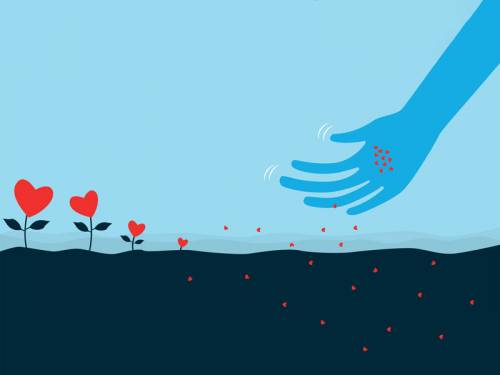Sowing the seeds of hope to reap a harvest of joy
By W. Tali Hairston | Presbyterians Today
 Romans 8 describes a world groaning and lamenting for its redemption. Not only Creation, the writer says, but we ourselves groan waiting for redemption of our bodies. The good news is that the Spirit of God intercedes, for nothing can separate us from the love of God.
Romans 8 describes a world groaning and lamenting for its redemption. Not only Creation, the writer says, but we ourselves groan waiting for redemption of our bodies. The good news is that the Spirit of God intercedes, for nothing can separate us from the love of God.
Our world continues groaning. Yet events embedded in political unrest, a pandemic and protests viewed through the lens of Romans 8, have become instructive for me. In engaging the hard places of life, accepting the ways in which the Spirit of God lovingly intercedes is deeply important. In my experience in ministry, though, we seem to stop at God’s loving embrace and not allow the loving intercession of the Spirit. This Spirit is the water in the desert leading us to hopeful actions that disrupt the groaning and lament of hopelessness.
Romans 8 inspires me whenever I experience paralysis and exhaustion from the overwhelming realities of our conflicted world. For me to stay present to the intercession of the Spirit and connected to the love of God means that I accept moments of hopelessness. Why? In the middle of all the profound theological questions of Romans 8 is a powerful revelation about hope. The text actually reads “for in this hope we were saved,” which requires an awareness of hopelessness.
Everything the Spirit is doing is designed to create hope in the world. Amid perilous and provocative times, the Spirit intercedes with hope. But hope is not simply a feeling word. Hope is an active waiting for what we do not have.
So, how is the Spirit interceding and producing hope-filled actions? This is where the story turns. The investment of our time, talent and treasure in these moments says a lot about whether we stopped at God’s loving embrace, but didn’t allow hope-filled actions to arise.
I have wrestled with this in my own life over the last six months. The groaning and lament in my neighborhood and city are overwhelming. Ministry calls me to be present to the suffering of people, to mourn with those who mourn. Additionally, I am personally lamenting the divisions, pain, confusion and fears of my own children. To be hopeful now seems as far as the east is from the west, or dare I say, the far right and far left. Who can be full of hope now? There are days I sit with pastors over Zoom, and the idea of hope feels unproductive. At times hope appears light as a feather, lacking relevance. How is the Holy Spirit going to invade this space? How are we to be people of hope now? Similar to Israel’s prayer as it entered Babylon, I wonder, “How can we sing in a strange land?”
Psalm 126:6, which says, “Those who go out weeping, bearing the seed for sowing, shall come home with shouts of joy, carrying their sheaves,” provides a way of thinking about hope and how we use our time, talent and treasure.
Let me provide some context. Instead of using the last remaining seed from the harvest for food, the sower would go weeping, sowing the seed hoping for a future harvest, as there was no guarantee. The promise from God is that our seeds of hope will bring shouts of joy because hope does not disappoint, for the love of God has been poured into our hearts by the Holy Spirit (Romans 5:5). We are reminded that seeds of hope will always bring a harvest of joy amid the groaning and lament.
What an opportunity we have right now in our ongoing divisive cultural and political context to sow seeds of hope that can bring about joy in the midst of weeping. What do these “seeds” look like? Examples include purchasing from businesses owned by those impacted by COVID-19 or buying children’s books from authors of color to use to school our kids from home. Our congregation sowed seeds of educational opportunities, engaging in conversations with the local Wi-Fi service provider to ensure that young people in our community schools were able to continue their studies.
There are many ideas and strategies of how to invest one’s time, talent and treasure as a seed of hope. We are all now being encouraged to be the kind of people who are seed-bearing sowers of hope in this groaning world.
W. Tali Hairston is a PC(USA) pastor and director of community organizing, advocacy and development at Seattle Presbytery. Hairston was the founding director of the John M. Perkins Center for Reconciliation, Leadership Training, and Community Development at Seattle Pacific University.
Support Presbyterian Today’s publishing ministry. Click to give
![]() You may freely reuse and distribute this article in its entirety for non-commercial purposes in any medium. Please include author attribution, photography credits, and a link to the original article. This work is licensed under a Creative Commons Attribution-NonCommercial-NoDeratives 4.0 International License.
You may freely reuse and distribute this article in its entirety for non-commercial purposes in any medium. Please include author attribution, photography credits, and a link to the original article. This work is licensed under a Creative Commons Attribution-NonCommercial-NoDeratives 4.0 International License.
Categories: Presbyterians Today
Tags: holy spirit, hope, Romans 8, talent, time, treasure
Ministries: Presbyterians Today